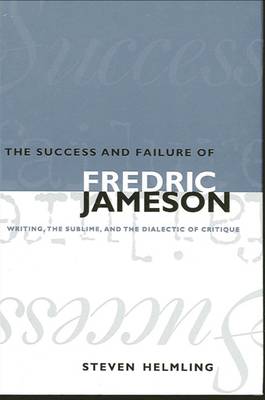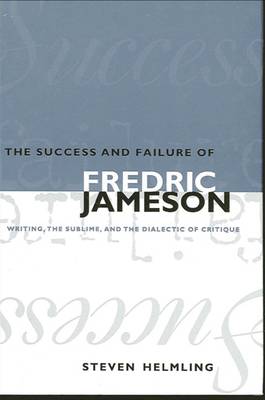
- Afhalen na 1 uur in een winkel met voorraad
- Gratis thuislevering in België vanaf € 30
- Ruim aanbod met 7 miljoen producten
- Afhalen na 1 uur in een winkel met voorraad
- Gratis thuislevering in België vanaf € 30
- Ruim aanbod met 7 miljoen producten
The Success and Failure of Fredric Jameson
Writing, the Sublime, and the Dialectic of Critique
Steven HelmlingOmschrijving
A critical overview of the work of Fredric Jameson, with an emphasis on his notoriously difficult writing style.
This is the first book to provide a critical overview of the work and career, as a whole, of the Marxist culture-critic Fredric Jameson, foremost among American intellectuals and a vanguard figure in the "theory movement" of the past three decades. Steven Helmling identifies major themes and traces both continuity and change in Jameson's engagement with the challenges presented by continental theory from the 1950s to the present. Instead of approaching Jameson's work by circumventing his notoriously difficult writing style, as many have chosen to do, Helmling takes at face value Jameson's insistence that the success and failure of critique are conditioned on how it is written. Jameson insists on a "dialectical prose" that not merely analyzes but enacts or performs the contradictions of its subjects, resulting in an agitating, dramatic, and compelling style that questions the very success or failure of critique itself. Style is thus regarded both as a salient feature of the writing, and as a problem for critical practice in general. Besides illuminating an oeuvre that's far from fully understood, the book makes a timely contribution to the current, "What was theory?" discussion.
Specificaties
Betrokkenen
- Auteur(s):
- Uitgeverij:
Inhoud
- Aantal bladzijden:
- 192
- Taal:
- Engels
- Reeks:
Eigenschappen
- Productcode (EAN):
- 9780791447642
- Verschijningsdatum:
- 9/11/2000
- Uitvoering:
- Paperback
- Formaat:
- Trade paperback (VS)
- Afmetingen:
- 149 mm x 226 mm
- Gewicht:
- 272 g

Alleen bij Standaard Boekhandel
Beoordelingen
We publiceren alleen reviews die voldoen aan de voorwaarden voor reviews. Bekijk onze voorwaarden voor reviews.











